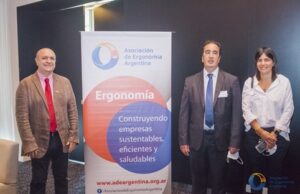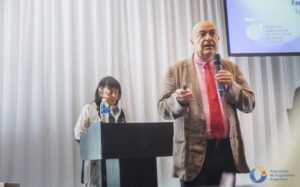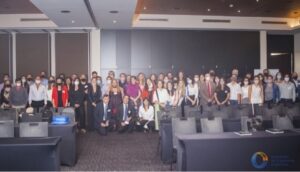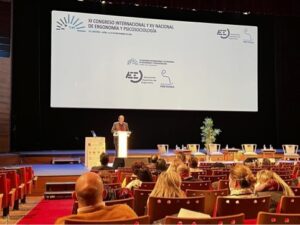
Argentina
On 26 November 2021, the 3rd National Ergonomics Congress organized by the Argentine Ergonomics Association (AdEA) was held in the northeast region. After several months in remote mode, the association convened a hybrid congress: the interested parties attended in person in the town of Rosario, Province of Santa Fe, as well as virtually via streaming. The event was attended by José Orlando Gomes, current president of the International Ergonomics Association (IEA), with an attendance of more than 150 people, the presentation of 14 papers, and the presentation of the first certificates of professionals recognized by AdEA and the Argentine Institute for Standardization and Certification (IRAM).
In the Argentine history of ergonomics, regional initiatives allowed the national development of the discipline and the professional one. In this sense, the professionals of the northeast region participated actively with the realization of physiological studies of human work from the 1940s, the creation of an Ergonomics Society in the 1960s, the creation of an applied Ergonomics laboratory in the 1970s that was active until the 2000s, among others (Hiba and Slemenson, 2019).
To give continuity to the congress topic, “The Development of Ergonomics in Argentina,” the program presented issues addressed in different sectors of activity, such as the agricultural sector, the manufacturing industry, the health sector, electronic sports, and the social and solidarity economy. The lectures presented various methods and techniques, which from self-confrontation interviews, surveys, and observations, among others, were valid to analyze work activity and user activity. Finally, several development axes were highlighted, among them professional, training, political, and institutional.
Bolivia
In September 2021, from September 28 to 30, the first International Ergonomics Congress was held in Bolivia. Held in a virtual environment, the Congress featured exceptional presentations from more than twelve countries from Latin America, USA, Spain, South Africa, and Japan. In addition, training workshops and research presentations were given by local ergonomists. The event achieved a massive attendance between locals and attendees from other Latin American countries, with more than 500 registered participants. After the event the Bolivian Ergonomics Association was formed, and the organizers hope to replicate this event every year and promote further development of ergonomics in Bolivia. Key note presentations were made by Prof. José Orlando Gomes, President of the IEA; Prof. Yushi Fujita, IEA Past President; Prof. Andrew Todd, Strategic Development and Implementation Ad Hoc Committee Chair; and the ID co-chairs for Latin America, Prof. Paulo Oliveira, and Eng. Martin Rodriguez.
Chile
The Chilean Society of Ergonomics, SOCHERGO, in collaboration with the School of Kinesiology of the University of Atacama, UDA, held the XIIth International Congress of Ergonomics, with the theme “Ergonomics Interventions for the Transformation of Work.” Particularly in this year, the organizers made the effort to translate simultaneously between Spanish and French, allowing the participation of Canadian and French-speaking specialists and stakeholders. More than 350 people participated in this online event from neighboring countries in Latin America, such as Costa Rica, Bolivia, Nicaragua, Mexico, Peru, and Ecuador, as well as Canada, France, Spain, and Portugal. Forty specialists participated in 9 forums that included union representatives, design, work at geographical height, and other topics.
Finally, on the day of the closing of the event, October 30, the “Day of the Ergonomics Specialist” was celebrated. More information is at www.sochergo.cl
Mexico
The Society of Ergonomists of Mexico (SEMAC) held its XXVII International Congress of Ergonomics virtually, from October 28 to 30. Approximately 350 attendees enjoyed this great congress endorsed by the Autonomous University of Baja California. IEA President Prof. José Orlando Gomes participated in the congress by giving a speech in the event’s Opening Ceremony. Research papers were presented and the 14th SEMAC Book on Investigations and Applications was published and can now be read at www.semac.org.mx
Spain
On 11-12 November 2021, and with the title of “Contributions of Ergonomics for the Work to Come,” the XIth International and XVth National Congress of Ergonomics and Psychosociology was held in Gijón. 150 people from Spain attended in person and the following Latin American countries were digitally connected: Peru, Mexico, Uruguay, Argentina, Colombia, Chile, and Ecuador.
On the 11th, it was the inauguration with the welcoming words of the director of the IAPRL, Miryam Hernandez and the president of the Spanish (AEE) and Asturian Ergonomics (PREVERAS) associations. In their interventions they agreed to recognize that these new times for occupational health are marked by the importance of mental health as a public problem, and that it is time to promote psychosocial risks and develop the practice of our specialty in a more creative way. The pandemic has generated a great social and economic crisis, and it is our responsibility to reflect on the way to respond–aiding and contributing in addition to promoting policies (health, economic, labor, and social security) that collect our contributions in order to change the way things are done.
The inaugural lecture, pre-recorded with the title: “Ergonomics in Turbulent Times,” was developed in collaboration with the newly elected president of the International Ergonomics Association (IEA), the Brazilian engineer and professor at the University of Rio de Janeiro, José Orlando Gomes, the first Latin American to chair the IEA (2021-2024) and the Argentine expert, former advisor to the ILO, Juan Carlos Hiba. His interventions referred to the increase in Latinity, not only due to the creation in recent years of new Latin American associations grouped in ULAERGO, but also due to the development of ergonomics in Portuguese-speaking African and Asian countries; a community that with the countries of Latin culture in Europe reaches a billion inhabitants. Alliances between communities and with public authorities should be sought to better transmit our contributions and grow in influence. If we want to continue protecting the health and safety of workers, we must protect ourselves, our specialty, our profession, and our jobs, and that will force us to develop entrepreneurial characteristics and make a great effort to innovate. Creativity, reinvention or design are common terms in the field of digitization, and in the speaker’s opinion, all professionals, regardless of their position, influence, or location in society or organizations, or the size or the sector in which they are employed, can and should put into practice imaginative techniques to solve the problems linked to a situation of mutation, which regardless of its end, will have radical effects in the economic, labor and social spheres, and will suppose a new way of doing things, different and with less means.










